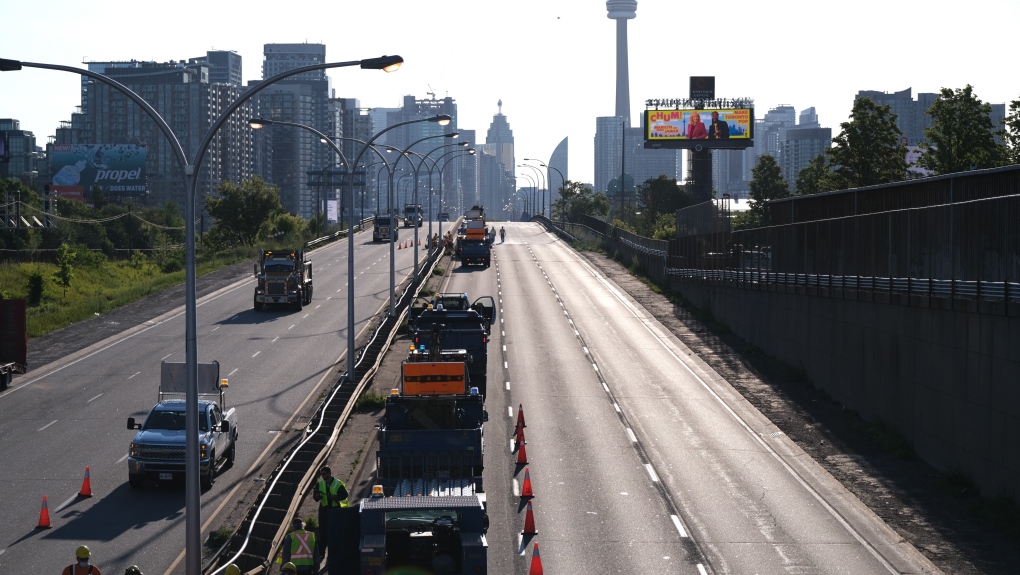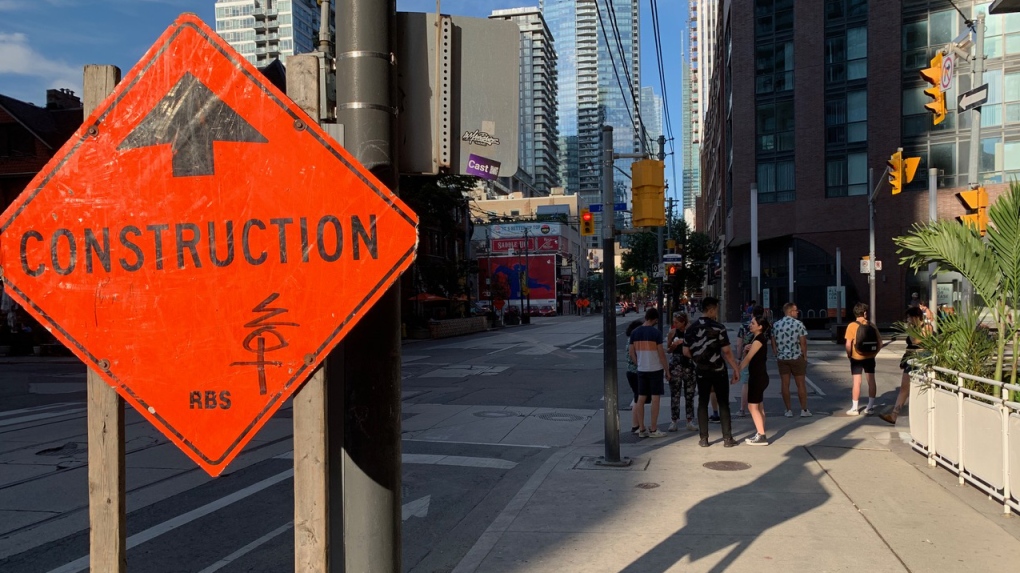How will Toronto fix its financial troubles in 2024?
This past year may have been a turning point in Toronto's spiralling financial woes, thanks in large part to a landmark new deal around the city's finances. However, the city is not out of the woods yet when it comes to its fiscal challenges, and some key questions will need to be answered in the year ahead.
“They (the city) are still in a really difficult financial strait,” Professor Matti Siemiatycki, director of the Infrastructure Institute at UofT, told CP24.com. “They have billions of dollars in backlog for capital investments, they still continue to have a budget gap as the budget season opens, and they have huge housing needs and other infrastructure investment needs that are going to stretch over decades.”
- Download our app to get local alerts on your device
- Get the latest local updates right to your inbox
The city said in August that it was facing a $46.5 billion shortfall over the next 10 years, including a $1.5 billion operating shortfall for 2024 and $29.5 billion in capital needs.
Toronto scored a big financial win recently in its new deal with the province, which is expected to provide $7.6 billion in capital relief in the coming years, as well as hundreds of millions of dollars to operate shelters and transit.
But that doesn’t solve the problem.
WHAT WILL HAPPEN TO DEVELOPMENT CHARGES?
One pressing issue for the near future is that the city is still waiting for reassurance from provincial officials on another major financial challenge, the loss of development charges in Ontario's housing legislation.
Announced in 2022, the More Homes Built Faster Act (Bill 23) mandates the City of Toronto to build 285,000 homes by 2031 and also mandates exemptions and reductions in development charges for non-profit, affordable and purpose-built rental homes in order to incentivize developers.
The city uses development charges associated with new construction in order to finance the municipal improvements that the new projects typically necessitate, such as improvements to water and sewage systems in an area.
According to the latest city report on the impact of the bill, loss of development charges will cost Toronto $2.3 billion over 10 years, or around $200 million a year in lost revenue.
When the legislation was introduced last year, former Mayor John Tory called it a "serious threat" to Toronto's finances. While the upload of the Gardiner Expressway and the Don Valley Parkway to the province has helped pull Toronto out of a deep financial hole in terms of its deficit, the threat from lost development charges still hangs over the city.
Ontario previously said that it would make the city “whole” for losses in revenue associated with its housing bill, but it said that would be contingent upon an audit of the city’s finances to ensure that money is being spent wisely. The audit condition was expanded to include Peel Region, Mississauga, Caledon, Brampton and Newmarket as well.
 Crews carry out maintenance work on the Gardiner Expressway in Toronto in this file photo. (Simon Sheehan /CP24)
Crews carry out maintenance work on the Gardiner Expressway in Toronto in this file photo. (Simon Sheehan /CP24)
As part of a suite of policy adjustments announced by Housing Minister Paul Calandra this month, the province said that it was dropping the audits. But the exemptions which will result in development charge losses are staying.
Instead of the audits, the province said, it will “engage in consultations with its municipal partners on the impacts of the More Homes Built Faster Act and municipalities’ ability to fund growth-related infrastructure that will support the construction of more homes.”
The statements did not make it clear how and when funds might flow to municipalities to compensate them for the lost charges.
“The mayor expects the province to honour their commitment to making Toronto whole,” Mayor Olivia Chow’s office said in an email to CP24.com Tuesday. Her office said that as per the latest staff report, city staff will continue to monitor the legislative changes and revisit the estimated impacts “as more information becomes available.”
Chow’s office did not say whether the matter had come up at recent discussions with the province on a new deal for the city.
“The mayor is hopeful the province will honour their commitment to provide the offsetting funding and make the City whole,” her office said.
A previous report by city staff said that the changes entailed in Bill 23 could ironically slow the pace of development in the city by making it harder for Toronto to fund critical infrastructure improvements necessary for development.
 Adelaide Street is pictured in downtown Toronto August 5, 2022. (Joshua Freeman /CP24)
Adelaide Street is pictured in downtown Toronto August 5, 2022. (Joshua Freeman /CP24)
If one wants to be an optimist, Siemiatycki said, the move away from “punitive” audits could be seen as a signal of a more collaborative approach. However the pressure is still on for both sides, he said.
“That lost revenue is major. It’s used to help pay for growth. We're in a housing crisis and there's broad agreement on the need to build more housing and that's what that money is for,” Siemiatycki said. “So to meet those (provincial) targets, the money has to come from somewhere. Either the province is going to make them whole or municipalities are going to have to find the money elsewhere.”
The province’s statement said the consultations will “inform potential legislative changes for the government’s upcoming Housing Supply Action Plan that would enhance municipalities’ ability to invest in housing-enabling infrastructure.”
Calandra also called on the federal government “to be a willing and able partner in supporting our province’s growth.”
WILL THE FEDS COME TO THE TABLE?
Both Mayor Olivia Chow and Premier Doug Ford have been calling on the federal government to provide more funding for the city on a number of fronts.
In fact, the province made some of the funding in the new deal contingent upon matching funds from the federal government.
 Toronto Mayor Olivia Chow arrives to West Block of Parliament Hill in Ottawa on Wednesday, Sept. 27, 2023. THE CANADIAN PRESS/Sean Kilpatrick
Toronto Mayor Olivia Chow arrives to West Block of Parliament Hill in Ottawa on Wednesday, Sept. 27, 2023. THE CANADIAN PRESS/Sean Kilpatrick
While Ottawa has shown some willingness to come to the table in terms of housing money through its federal Housing Accelerator Fund, and some commitments on funds for shelters, it remains to be seen whether the government will commit to the matching funds.
“You see this very often in Canadian politics, that you have two governments form a partnership, strike a deal, and then they go to the third and try to lever the fact that they've created other arrangements to bring the third on board,” Siemiatycki said. “So this is this is a part of the playbook and we'll see in this case, if the federal government comes with specific money beyond what has already been committed through some of the other programs.”
WHAT WILL THE CITY HAVE TO DO?
Even if both Queen’s Park and Ottawa come to the table, it's likely that the city will have to dig deep to help solve the problem as well.
Toronto City Council already started exploring revenue generating options this year, voting for graduated increases to the land transfer tax for homes above $3 million, a bump in the vacant home tax, and the removal of a five-dollar per hour cap for on-street parking.
Toronto taxpayers could get a property tax increase in the coming budget, though the exact percentage is still being worked out. Ina recent interview with CP24, Chow said she didn’t want to pre-empt the work of the budget committee, but said “all of that will get settled by mid-February.”
Public consultations on the budget were held in November and city officials have said they would help determine the funding priorities in the budget, as well as the tax rate.
While the city will likely have some tough choices, Siemiatycki said he thinks it’s likely that at the very least they won’t have to scrounge to replace the lost development charges themselves.
“I think the province and the municipalities will come to some arrangement ultimately about the development charges and making them whole,” he said. “Partly because there was a commitment made that they would be made whole, and partly because it's so central to the province’s mission of getting more housing built.”
Still, he noted the extent to which the city is impacted will depend on timing.
“I think they will ultimately come to an agreement. The question is, how long will it take and how acrimonious will it be to get there?”
CTVNews.ca Top Stories

Quebec fugitive killed in Mexican resort town, RCMP say
RCMP are confirming that a fugitive, Mathieu Belanger, wanted by Quebec provincial police has died in Mexico, in what local media are calling a murder.
Trump again calls to buy Greenland after eyeing Canada and the Panama Canal
First it was Canada, then the Panama Canal. Now, Donald Trump again wants Greenland. The president-elect is renewing unsuccessful calls he made during his first term for the U.S. to buy Greenland from Denmark, adding to the list of allied countries with which he's picking fights even before taking office.
Multiple OnlyFans accounts featured suspected child sex abuse, investigator reports
An experienced child exploitation investigator told Reuters he reported 26 accounts on the popular adults-only website OnlyFans to authorities, saying they appeared to contain sexual content featuring underage teen girls.
King Charles ends royal warrants for Ben & Jerry's owner Unilever and Cadbury chocolatiers
King Charles III has ended royal warrants for Cadbury and Unilever, which owns brands including Marmite and Ben & Jerry’s, in a blow to the household names.
'Serious safety issues': Edmonton building where security guard was killed evacuated
An apartment building where a security guard was killed earlier this month is being evacuated.
Santa Claus cleared for travel in Canadian airspace
Santa's sleigh has been cleared for travel in Canadian airspace, the federal government announced on Monday just ahead of the busy holiday season.
Ex-OpenAI engineer who raised legal concerns about the technology he helped build has died
Suchir Balaji, a former OpenAI engineer and whistleblower who helped train the artificial intelligence systems behind ChatGPT and later said he believed those practices violated copyright law, has died, according to his parents and San Francisco officials. He was 26.
U.S. House Ethics report finds evidence Matt Gaetz paid thousands for sex and drugs including paying a 17-year-old for sex in 2017
The U.S. House Ethics Committee found evidence that former Rep. Matt Gaetz paid tens of thousands of dollars to women for sex or drugs on at least 20 occasions, including paying a 17-year-old girl for sex in 2017, according to a final draft of the panel's report on the Florida Republican, obtained by CNN.
Young mammoth remains found nearly intact in Siberian permafrost
Researchers in Siberia are conducting tests on a juvenile mammoth whose remarkably well-preserved remains were discovered in thawing permafrost after more than 50,000 years.

































